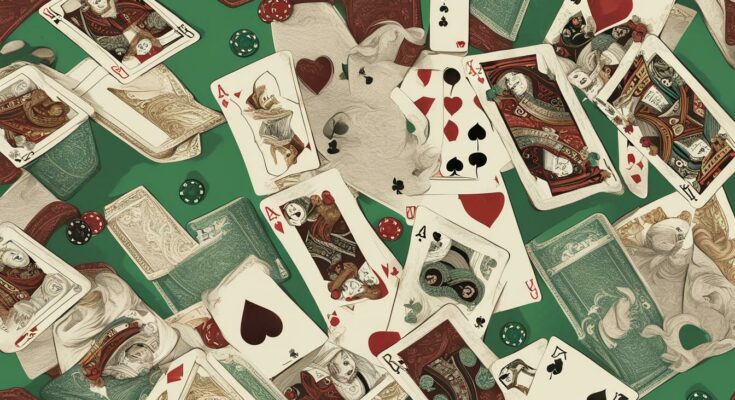Poker is a beloved and popular card game played all over the world. But where did it all begin? The origins of poker are shrouded in mystery and historians and poker enthusiasts have been trying for years to uncover the truth. In this article, we will take a journey through poker’s history, from its beginnings to the present day. We will explore the possible birthplaces of poker, its evolution over time, and the reasons for its enduring popularity.
Key Takeaways:
- Poker’s origins are a subject of much debate and speculation.
- The early history of poker is closely tied to the development of card games in Europe.
- Poker gained widespread popularity in America during the 19th century and became associated with the Wild West.
- Poker has continued to evolve and adapt in the modern era, including the rise of online poker.
A Historical Journey: Tracing the Origins of Poker
Poker is a popular card game enjoyed by millions of people around the world, but where did it all begin? The origins of poker are somewhat mysterious, with different theories about its birthplace and evolution over time. One thing is certain, though: the game has a rich history that has contributed to its enduring popularity.
One theory about the origins of poker suggests that it can trace its roots back to a Persian game called “As Nas,” which was played with a 25-card deck. The game involved betting and hand rankings, and some of the terminology used in As Nas is still used in poker today. However, there is little concrete evidence to support this theory.
Another theory is that poker evolved from the French game “Poque,” which was popular in the 17th century and involved bluffing and betting. This game, along with other European card games, may have influenced the development of poker as we know it today.
It’s also possible that poker originated in America, where it grew in popularity during the 19th century. The game was often played on riverboats traveling along the Mississippi River, and it was associated with the Wild West and frontier life. During this time, the 52-card deck we use today was also introduced.
Regardless of its exact origin, poker has certainly come a long way since its early days. The game has undergone many changes and variations over the years, including the introduction of Texas Hold’em in the early 20th century. Today, poker is played all over the world, and there are numerous variations of the game, both live and online.
So, while we may never know for sure where and how poker first began, it’s clear that the game has a fascinating history that has contributed to its enduring popularity. From its humble origins to its worldwide appeal, poker remains one of the most beloved and exciting card games around.
The French Connection: Possible Origins in Europe
While there is no definitive answer to the question of where poker originated, many historians believe that the game has roots in Europe. One prominent theory is that poker evolved from the French game “Poque,” which was popular in the 17th century.
Poque was played with a deck of 32 cards and involved betting and bluffing, much like poker. Another similar game, “Primero,” was played in Spain during the same time period and also involved betting and bluffing.
It is possible that these European games influenced the development of poker as we know it today. However, there are also other theories about the origins of poker, including its possible roots in Persian and Chinese card games.
From the Mississippi River to the Wild West: Poker in America
As poker evolved from its early origins, it found a new home in the United States. The game quickly caught on, particularly in the Southern states, and by the 1800s, it had spread across the country.
The Mississippi River played a significant role in the rise of poker in America. Riverboat gambling was incredibly popular in the mid-1800s, and poker was the game of choice for many gamblers. It was during this time that the basic rules of poker were established, including the concept of blinds and a dealer button.
As the game spread further west, it became associated with the Wild West and became a staple in saloons and casinos. Poker games were often held in secret rooms, and players often carried guns to protect themselves and their winnings.
Modern Adaptations and Online Poker
Today, poker has evolved significantly from its Wild West roots. The game has become more mainstream and is now enjoyed by millions of people around the world. With the rise of online poker, the game has become more accessible than ever before.
Online poker allows players to compete against others from around the world, and the game has even been recognized as a sport by some countries. Modern adaptations of the game, such as Texas Hold’em, have also added new elements to the game and have made it even more popular.
Despite its many variations and adaptations, poker’s roots can still be traced back to its earliest origins. From its humble beginnings in Europe to its rise in popularity in America, the game has undergone many changes over the years, but its fundamental principles have remained the same.
Poker Goes Global: International Growth and Variations
As poker spread across the United States, it also gained popularity in other parts of the world. In the early 20th century, the game made its way to Europe, where it quickly became a favorite pastime in casinos and private games.
Over time, different variations of the game emerged, each with its own unique rules and strategies. Some of the most popular variations include Texas Hold’em, Omaha, Seven-Card Stud, and Razz.
Today, poker is played all over the world, from Las Vegas and Atlantic City to Macau and Monte Carlo. The game has even made its way online, thanks to the rise of internet poker sites such as ทางเข้า Fun88.
Online poker has revolutionized the game, making it more accessible than ever before. Players can now play from the comfort of their own homes, competing against opponents from around the globe.
Despite the variations and innovations, the fundamental rules of poker remain unchanged. Players still aim to form the best five-card hand possible, using a combination of their own cards and the community cards on the table.
Whether you’re playing in a casino or online, poker is a thrilling and challenging game that requires both skill and strategy. It has come a long way since its humble beginnings, but its popularity shows no signs of slowing down.
Poker Today: Modern Adaptations and Online Poker
Over the years, poker has evolved significantly, with new variations and adaptations that have transformed the game and brought it to a global audience. One of the most significant changes in recent history is the rise of online poker, which has made the game accessible to anyone with an internet connection.
Today, players can enjoy a range of different versions of poker, from Texas Hold’em to Omaha, each with their own set of rules and strategies. The growth of poker tournaments, both live and online, has also contributed to the popularity of the game, with millions of dollars in prize money up for grabs.
At the same time, technology has played a crucial role in the development of poker. From advanced software that tracks gameplay to virtual reality poker rooms, the game has embraced innovation to attract a new generation of players.
But despite these changes, the core principles of poker remain the same. The game still requires skill, strategy, and a bit of luck to come out on top. As the saying goes, poker is a game that takes a minute to learn but a lifetime to master.
Poker Today: Modern Adaptations and Online Poker
As technology has advanced, so too has the game of poker. One of the most significant changes in recent years has been the rise of online poker. With the ability to play from anywhere in the world at any time, online poker has made the game more accessible and brought new players to the table.
In addition to online poker, there have been many modern adaptations of the game. For example, Texas Hold’em has become the most popular form of poker in the world, thanks in part to its inclusion in the World Series of Poker. Other variations such as Omaha and Seven Card Stud have also gained popularity among players.
Another notable development in modern poker is the use of technology to enhance gameplay. From virtual reality poker rooms to software that helps players analyze their strategy, technology has had a significant impact on the game.
However, these changes have not been without controversy. Some traditionalists argue that online poker and modern adaptations have strayed too far from the original game and lack the same level of skill and strategy. Despite these criticisms, poker continues to evolve and adapt with the times.
The Future of Poker
As we look to the future, it is clear that poker will continue to evolve and adapt. New technologies will likely play a significant role in shaping the game, and we can expect to see new variations and formats emerge.
However, one thing is certain: the origins of poker will always be a vital part of the game’s history and culture. Whether we are playing in a brick-and-mortar casino or competing in an online tournament, we are all part of a tradition that stretches back centuries.
So the next time you sit down at the table, take a moment to reflect on the rich history and origins of this beloved game. From its humble beginnings in Europe to its global popularity today, poker has come a long way – and it has an exciting future ahead.
FAQ
Q: Where did poker originate?
A: The exact origins of poker are uncertain, but it is believed to have evolved from various European card games and been influenced by early American gambling culture.
Q: What is the history of poker?
A: Poker has a long and rich history, with its roots stretching back centuries. It has evolved and adapted over time, becoming the popular game we know today.
Q: How did poker spread to America?
A: Poker was brought to America by early European settlers and was played in various forms across the country. It gained popularity during the 19th century, particularly during the era of the Wild West.
Q: Are there different variations of poker?
A: Yes, there are numerous variations of poker played around the world today. Each variation has its own set of rules and strategies, offering players different experiences and challenges.
Q: How has technology influenced the game of poker?
A: Technology, particularly the rise of online poker platforms, has had a significant impact on the game. Players can now access poker games anytime, anywhere, and compete against players from all over the world.
Q: What is the conclusion about the origins of poker?
A: While the exact origins of poker may never be fully known, it is clear that the game has a rich and complex history, influenced by various cultures and traditions. Its evolution and global popularity are a testament to its enduring appeal.




